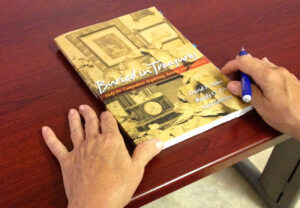
DOWNTOWN — Mary knew she was in trouble when she realized she couldn't park the new car she received as a gift in her garage earlier this year.
That was because her garage was filled to the brim with boxes. She was collecting things like fabric; chairs; and scuba diving, skiing and backpacking equipment.
"You name it, I had it," Mary, who declined to give her last name, said.
Mary was one of 15 participants in the From Collecting to Cluttering program offered by WISE & Healthy Aging earlier this year. She said she saw the ad and decided she needed to join because after she cleared out the boxes from her garage, they migrated to the inside of her home.
Officials said the program, which was popular among the elderly at WISE, will be offered again next month. The program was formed to address the needs of elderly who have problems with collecting and clutter and want help and support. Officials said participants sign up for the program because they acknowledge there is a problem, which can vary in severity.
"The purpose is to give ongoing support for people who have been going through this issue," Sheila Segal, director of peer counseling at WISE, said. "There's a value in being together with a group of strangers because there is less shame involved and less worry of being judged by family members and comfort of knowing you're not alone."
Next month, the program, which is taught by peer counselors, will cover 15 sessions over 20 weeks and cost $3 per session. Participants, who meet weekly, will do homework out of "Buried in Treasures," a book which the program provides. Participants can be a part of a support group after the program is completed, which meets twice monthly.
Segal said low-income seniors aren't turned away from the program.
Mary is part of the support group, led by Ellen Satkin, a peer counselor. Mary, who called herself a "clutterer," but acknowledged she did have hoarding tendencies in the past, said it's not easy to let go of belongings or things. She said she is still in the process of giving away items from her plethora of boxes.
"The most glorious thing is finding out you're not alone and there are techniques to handle this, whatever my issue or someone else's may be," Mary said. "It's not this instant fix. I want to maintain my skills and improve them even more."
Karron Maidment, registered nurse and marriage and family therapist at Santa Monica-UCLA Medical Center's Obsessive-Compulsive Disorder Intensive Treatment Program, said the classes at WISE are excellent to impart knowledge, give support and exchange ideas among the elderly. She said people who hoard may not be able to get rid of stuff without help.
That "stuff' includes paperwork, boxes, old news articles, memorabilia and more.
Maidment said there are two groups of people who hoard: from a young age and those who develop hoarding when they're middle-aged or older.
"It's useful to point out there's lots of different types of hoarding," Maidment said. "When we talk about hoarding in the psychiatric world, we're referring to compulsive hoarding which is the result of a very distinct brain anomaly."
She said the anomaly lies in the anterior and posterior cingulate cortex, which isn't functioning as efficiently as they should. Those parts of the brain have to do with organizing and visual and spatial problems, Maidment said.
Thea Drayer, a peer counselor, said the program is a step-by-step approach. She said the program first makes the participants aware of what the problem is and gives them tools to address it.
"People like to buy stuff they don't need," Drayer said. "So we go over this and talk to them and send them to non-acquiring trips and don't buy anything. When they feel bad, they go on shopping sprees."
The idea for the initial program was formed after a three-day workshop more than a year ago on cluttering and collecting was deemed a success by officials.
Segal said the group of participants aren't called "hoarders" because "that's the fastest way to make people disappear." She said the language is a painful diagnosis and the program's aim is to encourage people to address their own challenges.
Not just a mental problem
Hoarding or collecting too much food, personal belongings or canned goods inside a home can be a safety concern for the elderly, said Joe Trujillo, code enforcement division manager with City Hall.
"We're concerned with their safety in the property and not creating a safety hazard by blocking the exits or heating vents," Trujillo said. City officials deal with a lot of cluttering and hoarding cases involving the elderly.
Trujillo said when dealing with elderly cluttering cases, there's a lot of expertise that City Hall utilizes from the Los Angeles County Health Services and Adult Protective Services, among others.
"A lot of times the enforcement may not be the best ... and we have to work with them on what is trash and harmful to surrounding properties and what actually belongs to them," Trujillo said.
Segal said the program will be ongoing throughout the year and if those interested don't get into September's program, there are other opportunities later on in the year. There is limited space for next month's program.
Those who are interested can attend the orientation meeting on Wednesday, Aug. 14 at the Ken Edwards Center at 12:30 p.m. For more information, call (310) 394-9871 ext. 373 or ext. 215.
ameera@www.smdp.com









